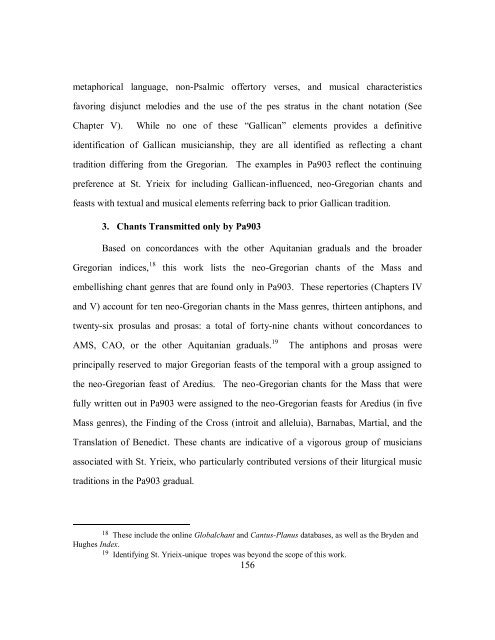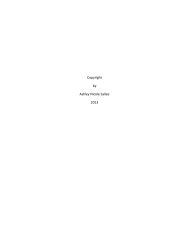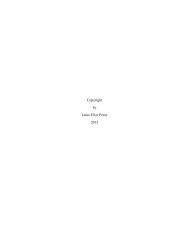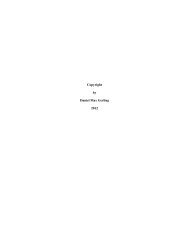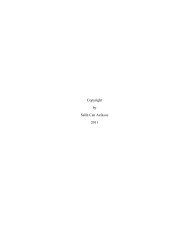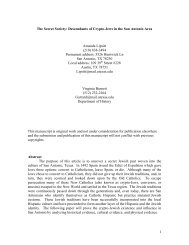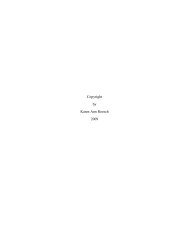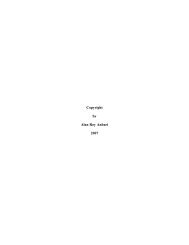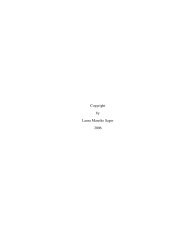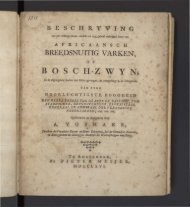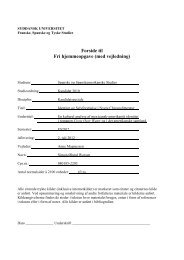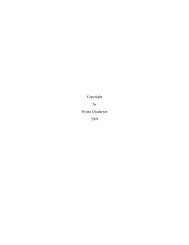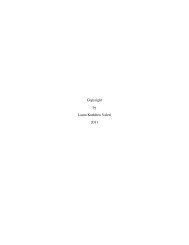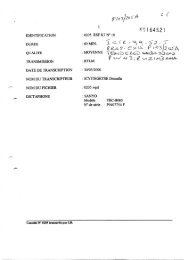- Page 1 and 2:
Copyright by William Manning Sherri
- Page 3 and 4:
The Gradual of St. Yrieix in Eleven
- Page 5 and 6:
Acknowledgements I express deep gra
- Page 7 and 8:
Yrieix favored its senior patron St
- Page 9 and 10:
C. Elements of Usage in Pa903 and R
- Page 11 and 12:
3. Chants Transmitted only by Pa903
- Page 13 and 14:
Table 5-6 Pa903 Neo-Gregorian Conco
- Page 15 and 16:
List of Figures Figure 1-1 Map of A
- Page 17 and 18:
I. Introduction A. AREDIUS AND THE
- Page 19 and 20:
As a further part of the renewal pr
- Page 21 and 22:
(particularly from PM13) has also b
- Page 23 and 24:
the region. 17 The usage of St. Yri
- Page 25 and 26:
dependency of the Collegiate Church
- Page 27 and 28:
In contrast to the Aredius hagiogra
- Page 29 and 30:
funeral Aredius saved two women suf
- Page 31 and 32:
Table 2-1 List of St. Aredius Beque
- Page 33 and 34:
anachronism in these vitae, authors
- Page 35 and 36:
hagiography of Aredius, from Mabill
- Page 37 and 38:
Figure 2-2 Summary of Events in the
- Page 39 and 40:
According to Carolingian law, the l
- Page 41 and 42:
Seguin as the last abbot of St. Yri
- Page 43 and 44:
eferences in the diploma to the fai
- Page 45 and 46:
officially promulgated canonization
- Page 47 and 48:
(d.) The Later Centuries After the
- Page 49 and 50:
Figure 2-3 Chapter Church of St. Yr
- Page 51 and 52:
Figure 2-5 Saint Yrieix Bible, Thir
- Page 53 and 54:
Table 2-2 St. Aredius and St. Yriei
- Page 55 and 56:
their reforming initiatives. This i
- Page 57 and 58:
eflect the growing security and imp
- Page 59 and 60:
Table 3-1 Contents Pa903 Based on C
- Page 61 and 62:
Figure 3-1 Example Initials and Cap
- Page 63 and 64:
The ornamental pen-work in the desi
- Page 65 and 66:
includes the early eleventh-century
- Page 67 and 68:
the patron saint and other senior p
- Page 69 and 70:
patterns of association between 263
- Page 71 and 72:
Pa903. Finally, there are sixteen A
- Page 73 and 74:
Table 3-2 Neo-Gregorian Regional an
- Page 75 and 76:
century Collegiate Church of St. Ma
- Page 77 and 78:
that is also found in Harley4951, P
- Page 79 and 80:
Appendix A3-4 compares the sanctora
- Page 81 and 82:
5. Summary Liturgical usage as refl
- Page 83 and 84:
were also chosen for St. Yrieix whi
- Page 85 and 86:
through the intercession of Aredius
- Page 87 and 88:
The principal goal of this Section
- Page 89 and 90:
Table 4-1 Pa903 Regional Antiphons
- Page 91 and 92:
Contiued Pa903 Antiphon Incipit PM1
- Page 93 and 94:
Table 4-2a St. Yrieix Antiphon Repe
- Page 95 and 96:
These eleventh-century antiphons, c
- Page 97 and 98:
Table 4-3 Troped Masses in Pa903 Ma
- Page 99 and 100:
Table 4-4 Pa903 Tropes for Chants N
- Page 101 and 102:
Table 4-6(a) Pa903 Kyrie Tropes Inc
- Page 103 and 104:
Table 4-7 Pa903 Gloria, Sanctus, Ag
- Page 105 and 106:
melisma. Appendix A4-3 lists both g
- Page 107 and 108:
(b.) Alleluia Prosas in Pa903 Pa776
- Page 109 and 110:
Table 4-9 Offertory Prosulas of Pa9
- Page 111 and 112:
E. PROMINENT EMBELLISHED MASSES The
- Page 113 and 114:
sacramentaries that were not includ
- Page 115 and 116:
A. OVERVIEW V. Neo-Gregorian Chants
- Page 117 and 118:
and (2) local neo-Gregorian chants
- Page 119 and 120:
Table 5-2a Temporal and Ritual Mass
- Page 121 and 122: The sanctoral clearly contains the
- Page 123 and 124: (a.) Chants of the Temporal and Rit
- Page 125 and 126: Table 5-5 Pa903 Prominent Neo-Grego
- Page 127 and 128: Table 5-6 Pa903 Neo-Gregorian Conco
- Page 129 and 130: century missal from Veroli. 19 The
- Page 131 and 132: line (the custos, marked 5) indicat
- Page 133 and 134: This gradual follows Gregorian conv
- Page 135 and 136: There are two prosas for the Arediu
- Page 137 and 138: Figure 5-2d The Aredius Prosa Allel
- Page 139 and 140: OFFERTORY p.220 Immaculatas hostiar
- Page 141 and 142: (b.) Communion The Communion (Figur
- Page 143 and 144: Figure 5-5 The Aredius Prosa Astra
- Page 145 and 146: Table 5-9 Introit Trope Sets for St
- Page 147 and 148: Table 5-10 Neo-Gregorian Masses for
- Page 149 and 150: week of Lent suggests a new regiona
- Page 151 and 152: 2. Mass for the Dead The neo-Gregor
- Page 153 and 154: E. NEO-GREGORIAN MASS CHANTS AND GA
- Page 155 and 156: the Saturninus offertory : …victi
- Page 157 and 158: Table 5-12 Traditional Gallican Cha
- Page 159 and 160: (with the Gregorian chants removed)
- Page 161 and 162: Gregorian feast included in the tra
- Page 163 and 164: expressed visions of the sanctity a
- Page 165 and 166: through the Middle Ages. 1 Historic
- Page 167 and 168: fact by the Bishop and Viscounts of
- Page 169 and 170: the chant texts of the Cassinese ne
- Page 171: Aquitanian gradual (Pa776), while t
- Page 175 and 176: the neo-Gregorian chants for neo-Gr
- Page 177 and 178: to fill in the issues in geographic
- Page 179 and 180: Appendices APPENDIX A3-1 FRONT GUAR
- Page 181 and 182: APPENDIX A3-2 TABLE OF ST. YRIEIX S
- Page 183 and 184: Table Continued Pa903 Item AMS GALL
- Page 185 and 186: APPENDIX A3-3 PA903 AMS GALL TOURS
- Page 187 and 188: 171
- Page 189 and 190: 173
- Page 191 and 192: 175
- Page 193 and 194: 177
- Page 195 and 196: 179
- Page 197 and 198: 181
- Page 199 and 200: APPENDIX A4-1 PA903 ANTIPHONS Compl
- Page 201 and 202: Pa903 Antiphon Incipit PM13p/f AMS
- Page 203 and 204: Pa903 Antiphon Incipit PM13 p./f. A
- Page 205 and 206: Pa903 Antiphon Incipit PM13/f. AMS
- Page 207 and 208: Table A4-1.2 Gregorian Antiphons in
- Page 209 and 210: APPENDIX A4-2 PA903 TROPES Table A4
- Page 211 and 212: Pa903 Tropes Incipit PM13ff. Commen
- Page 213 and 214: Pa903 Tropes Incipit ff. Comment In
- Page 215 and 216: 199
- Page 217 and 218: 201
- Page 219 and 220: Table A5-1.1 Complete List of Neo-G
- Page 221 and 222: Neo-Greg chants continued Incipit P
- Page 223 and 224:
Neo-Greg chants continued Incipit P
- Page 225 and 226:
Neo-Greg chants continued Incipit P
- Page 227 and 228:
Neo-Greg chants continued Incipit P
- Page 229 and 230:
Table A5-1.4 Sanctoral Feasts in Pa
- Page 231 and 232:
Table A5-1.5 Neo-Gregorian Chants o
- Page 233 and 234:
Chants of the Temporal cont’d Inc
- Page 235 and 236:
Table A5-1.7 Neo-Gregorian Chants o
- Page 237 and 238:
Neo-Greg in Greg Sanctoral cont’d
- Page 239 and 240:
Neo-Greg Chants in Neo-Greg Sanctor
- Page 241 and 242:
APPENDIX A5-2 FINDING OF THE CROSS:
- Page 243 and 244:
Table A5-2.2b Finding of the Cross
- Page 245 and 246:
APPENDIX A5-3 AQUITANIAN NOTATION O
- Page 247 and 248:
APPENDIX A5-4 NEO-GREGORIAN MASS CH
- Page 249 and 250:
Appendix 5-4, Table A5-4.1 cont‟d
- Page 251 and 252:
Table A5-4.1 (Continued) 4/4 235
- Page 253 and 254:
Table A5-4.2 Continued Incipit Pa90
- Page 255 and 256:
APPENDIX A5-5 TRANSCRIPTIONS OF THE
- Page 257 and 258:
GR Beatam Aredii animam ad caelos C
- Page 259 and 260:
PM13:220 OF: Immaculatas hostiarum
- Page 261 and 262:
PM13:220 Aredius OF Verse 1 O incli
- Page 263 and 264:
Figure A5-5.6 Finding of the Cross
- Page 265 and 266:
PM13:207 Figure A5-5.8 Pa903 Benedi
- Page 267 and 268:
PM13:194 Figure A5-5.10 Barnabas Al
- Page 269 and 270:
Bibliography Aigrain, René, “Are
- Page 271 and 272:
http://www.uniRegensburg.de/Fakulta
- Page 273 and 274:
Gregory of Tours. The History of th
- Page 275 and 276:
Justmann, Dean Richard. “Mode-one
- Page 277 and 278:
Montalembert, Charles Forbes, comte
- Page 279 and 280:
ömische und alt-spanische repertoi
- Page 281:
Vita William M. Sherrill is a nativ


